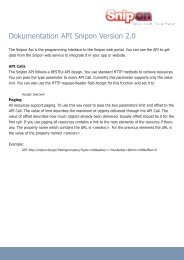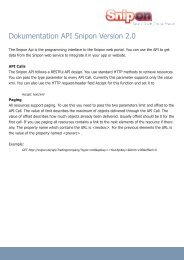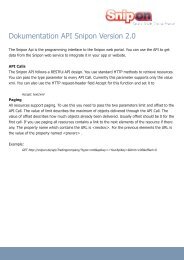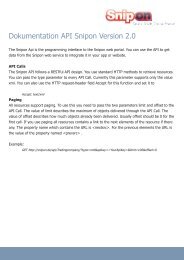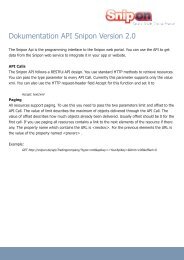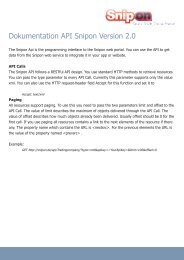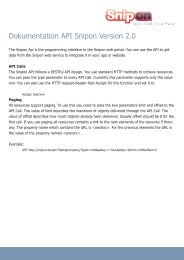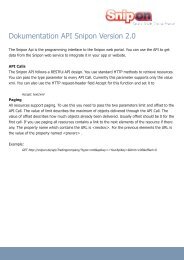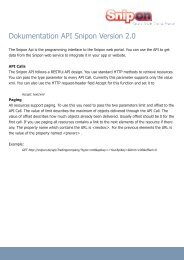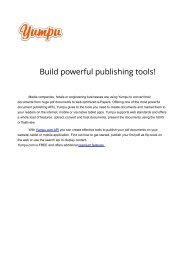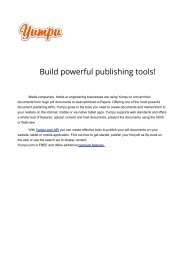test_pdf.pdf
You also want an ePaper? Increase the reach of your titles
YUMPU automatically turns print PDFs into web optimized ePapers that Google loves.
CLOSING<br />
ADDRESS<br />
Senator Jack Reed<br />
DARYL KIMBALL: I am pleased to introduce to you Senator Jack Reed of Rhode<br />
Island. He is the ranking Democrat on the Armed Services Committee’s Strategic Forces<br />
Subcommittee, among other key posts. He is one of the key leaders on the issues that we’ve<br />
been discussing today. As a member of that committee he is in the rough-and-tumble on<br />
the policy debates—the defense authorization bill really debates on these issues. He’s<br />
agreed to share with us his perspectives on the role of arms control in building U.S.<br />
national security in the future.<br />
He is, in my view, one of the most informed and active members in the Senate on<br />
these issues. He has been a stalwart defender of our first line of defense, proven preventative<br />
arms control strategies, at a time when there are those, as we’ve heard earlier<br />
today, in the administration who are not so enamored of these approaches, and at a<br />
time when we’re seeing these approaches being undercut in various ways.<br />
I just want to note in particular something that he did last year, which is particularly<br />
important and will continue to be an issue in the years ahead. He was pivotal in<br />
the debate concerning the future research on U.S. nuclear weapons. He introduced a<br />
very important amendment on the floor of the Senate that I think would have been<br />
approved if it was allowed to be voted on directly, but it was second-degreed by the<br />
chairman of the Armed Services Committee, Senator [John] Warner. And his amendment<br />
would have essentially preserved the 1994 ban on research leading to the development<br />
of low-yield nuclear weapons. And though that vote was narrowly lost, I know<br />
from hearing him, his speeches, and talking to his staff that he’s going to remain a<br />
dedicated and outspoken proponent of rational policies on this particular topic.<br />
And I just want to quote for you something that you said, Senator Reed, after that<br />
debate. I don’t know if you remember, but I thought it was a very important statement at<br />
that stage and a very relevant statement for our conference today. You said on the floor<br />
on September 16 th that “After 50 years of being the leading nation in the world arguing<br />
for arms control, arguing for sensible constraints on the development of nuclear weapons<br />
and the limits on nuclear weapons, we have become a nation that is casual about<br />
our commitment to arms control, that denigrates it too often, and that course has left us<br />
with other options which I think are less appropriate. If there is no arms control, then<br />
there is a higher probability of arms usage with nuclear weapons. This is a thought that<br />
no one wants to contemplate.”<br />
I think these are very important words as we go into the 21 st century, and I’m<br />
pleased to introduce Senator Jack Reed.<br />
SENATOR JACK REED (D-RI): Thank you very much, Daryl, for those very kind<br />
words of introduction. I’d like to recognize of course Daryl but also John Steinbruner of<br />
the Arms Control Association. Professor Steinbruner was a young professor when I<br />
was a young but very unprecocious student at the Kennedy School of Government, so<br />
it’s nice to join him again. I’d also recognize Robert Gallucci, the dean of Georgetown<br />
University’s Edmund A. Walsh School of Foreign Service, and Michael Brown, the<br />
director of the Center for Peace and Security Studies. And a special word about Paul<br />
Warnke, who devoted his life to diplomacy, who was a tireless advocate and practitioner<br />
of arms control, and in whose honor and memory this conference is being held.<br />
In 1946, in a speech to the governing board of the Pan-American Union, President<br />
Harry Truman, the only person ever to authorize the use of nuclear weapons, said,<br />
“Before us now lies a new era in which the power of atomic energy has been released.<br />
That age will either be one of complete devastation or one in which new sources of<br />
66<br />
66



